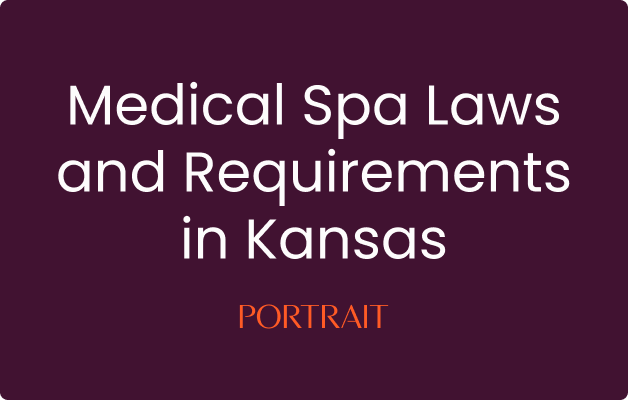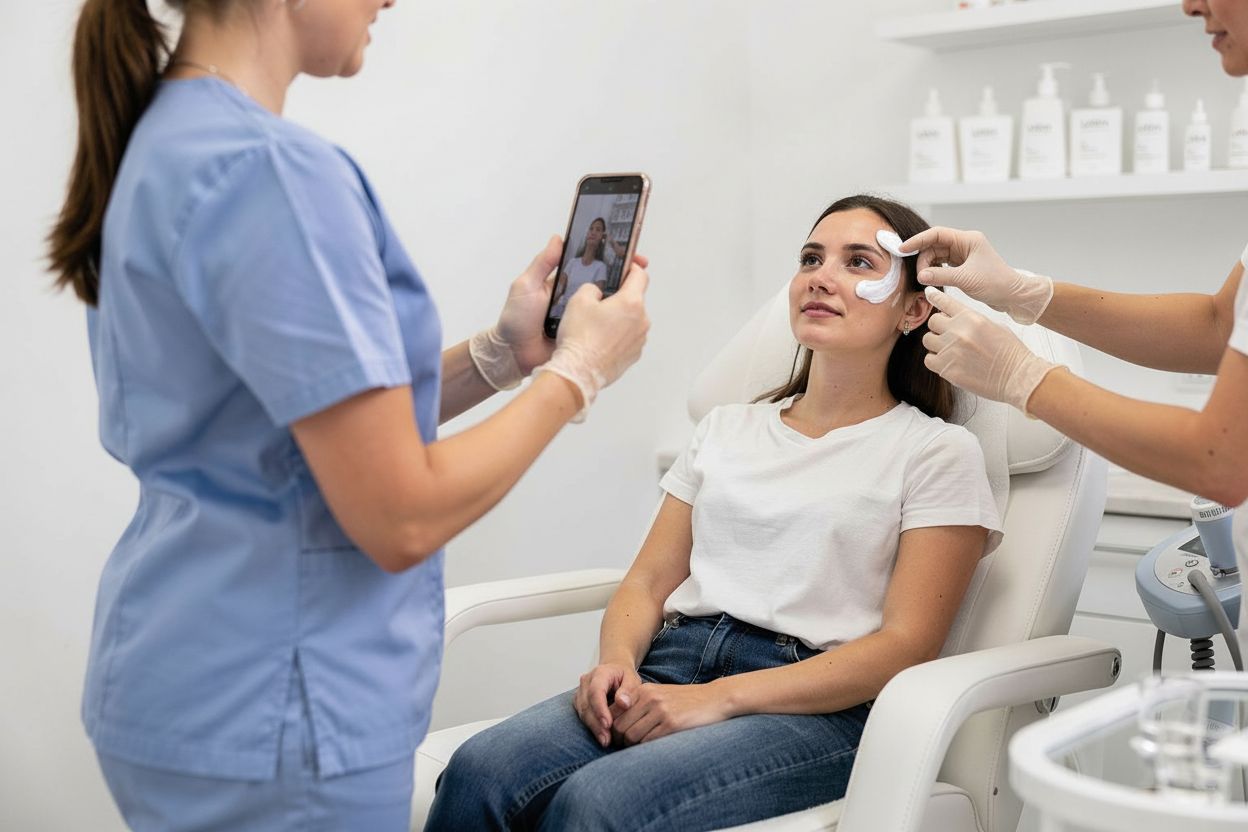Medical Spa Laws and Requirements in Kansas

Empowering Professionals at Every Stage
Portrait offers strategic expertise to help you make informed decisions and achieve long-term success.
Book Intro CallWhile Kansas law does not provide a specific statutory definition for a “medical spa,” it does regulate these businesses by defining who can own and operate one. To help you run your clinic with confidence, this guide breaks down the essential state requirements for ownership, licensing, and supervision.
How Medical Spa Laws Work in Kansas
In Kansas, a medical spa is treated as a medical practice because it provides clinical services, distinguishing it from a traditional day spa. While the state lacks a specific legal definition, the key difference lies in the medical procedures offered, such as cosmetic injections or laser treatments. This distinction is central to understanding the medical spa laws in Kansas.
These procedures trigger a higher level of oversight to protect patient safety and ensure proper med spa compliance. Unlike day spas, med spas must follow strict protocols for patient evaluation and documentation. Adhering to these medical spa requirements in Kansas is critical for lawful operation.
Consequently, multiple agencies oversee operations, with the primary license for the facility coming from the Kansas State Board of Healing Arts. Additionally, the professionals performing services are governed by their own licensing bodies. These include the Kansas Board of Nursing for nurses and the Kansas Cosmetology Board for aestheticians.
Medical Spa Requirements in Kansas
Understanding the medical spa requirements in Kansas is fundamental to your clinic's success. The most significant of the medical spa laws in Kansas dictates who can own a med spa, restricting ownership to licensed physicians. Beyond this, we will explain the necessary licenses, the role of a medical director, and the operational protocols that define proper med spa compliance.
Medical Spa Ownership & Business Structure Requirements in Kansas
The medical spa ownership laws in Kansas are direct, stating that only a licensed physician (MD or DO) can own a medical practice, which includes med spas. This regulation is a strict application of the Corporate Practice of Medicine (CPOM) doctrine, which broadly prohibits corporate or non-physician ownership of clinical businesses. Adhering to these medical spa laws in Kansas is critical, as non-compliance can lead to severe penalties.
However, non-physicians can still participate in the industry through a Management Services Organization (MSO) structure. In this arrangement, a non-physician entity can own the non-clinical assets and manage business operations while a physician-owned practice provides all medical services. Regardless of the structure, all spas in Kansas must appoint a licensed physician as a medical director to ensure proper med spa compliance and oversight.
Facility, Licensing, and Compliance Requirements in Kansas
To operate legally, your clinic must secure a license from the state board of healing arts, which is a primary step in how to open a med spa in Kansas. Additionally, every professional performing clinical services must hold the appropriate, active license for their specific role. These medical spa requirements in Kansas ensure that all services are delivered by qualified individuals.
Proper med spa compliance also extends to patient data and documentation. Your clinic must maintain clinical records to the same standard as any medical office, and all patient information should be stored using HIPAA-compliant software. Buyers will closely examine your HIPAA compliance record, making it a key factor in your practice's valuation.
Finally, while the sources do not detail specific state mandates for insurance, carrying both malpractice and general liability policies is standard practice for spas in Kansas. Similarly, your advertising must be truthful and avoid misleading claims to align with professional conduct standards. Adhering to these operational med spa regulations in Kansas is essential for protecting your business and building patient trust.
Who Can Perform Medical Spa Procedures in Kansas?
In Kansas, procedures that alter living tissue, such as injections and laser treatments, are considered medical services requiring clinical oversight. While the state does not provide a definitive list separating “medical” from “cosmetic” tasks, the nature of the service dictates the required level of professional qualification. This distinction is a core part of the medical spa laws in Kansas and is critical for med spa compliance.
Only appropriately licensed professionals may perform treatments at spas in Kansas. Physicians (MDs/DOs) and nurse practitioners operating under physician supervision are permitted to provide certain medical aesthetic services. The exact scope for other licensed professionals, like physician assistants or registered nurses, depends on their individual licenses and the delegation protocols set by the medical director.
Specific guidance on who can inject Botox in Kansas or what the laser regulations in Kansas entail is not explicitly defined in state statutes, creating a complex regulatory environment. Therefore, all delegation of medical tasks must be handled with care, ensuring the provider has the proper training and licensure for the procedure as determined by the supervising medical provider. Adhering to these medical spa requirements in Kansas protects both your patients and your practice from liability.
Laser & Energy Device Regulations in Kansas
The med spa regulations for lasers and energy devices in Kansas are not explicitly defined, which requires careful navigation. State law lacks a specific definition for lasers, IPL, or radiofrequency devices and does not outline unique laser technician requirements. This ambiguity in the medical spa laws in Kansas means operators must rely on general medical practice standards to ensure med spa compliance.
Since these treatments are considered medical procedures, their performance is governed by the general medical spa requirements in Kansas. A licensed professional must perform or delegate the task, with the supervising medical director remaining responsible for ensuring the operator is qualified. This oversight is fundamental for all spas in Kansas offering advanced treatments.
Without specific state mandates for training or adverse event reporting, the responsibility falls to your clinic's leadership. Your medical director must verify adequate training and establish strict protocols for managing any complications as medical incidents. These internal standards are critical for protecting your practice and upholding patient safety.
Medical Spa Enforcement, Penalties & Risk Management in Kansas
Failing to adhere to the medical spa laws in Kansas can expose your practice to significant legal and financial penalties. The Kansas State Board of Healing Arts and other professional boards actively enforce these med spa regulations, and non-compliance is not taken lightly. Understanding the most common violations is the first step toward building a resilient clinic. Violations of the medical spa requirements in Kansas often lead to enforcement actions ranging from cease-and-desist orders and fines to formal board discipline against a professional’s license.
The most frequent compliance failures that attract disciplinary action include:
- Unlicensed Practice: This includes violating the rules around who can own a med spa and allowing unqualified individuals to perform medical procedures. Penalties can be severe, impacting the entire business.
- Improper Delegation: A medical director is professionally responsible for all delegated tasks. Inadequate supervision or delegating procedures outside a provider’s scope of practice can result in license suspension or revocation.
- False Advertising: Making misleading claims about treatment outcomes or a provider’s qualifications violates professional conduct standards and can lead to fines and public reprimands for spas in Kansas.
While the consequences are serious, maintaining med spa compliance is achievable with clear, proactive protocols. Protecting your clinic involves a consistent approach to operations and documentation. Here are key practices to help you stay compliant:
- Perform routine internal audits of your documentation, delegation protocols, and HIPAA procedures to identify and correct potential issues.
- Implement ongoing training for every team member on their specific scope of practice, patient safety, and the latest med spa regulations.
- Maintain detailed and organized records for patient charts, consent forms, and staff credentials; this documentation is your first line of defense in an audit.
Stay Compliant with Portrait Care in Kansas
Operating a compliant medical spa in Kansas means focusing on a few key areas: ensuring physician-only ownership, securing the proper facility license from the Kansas State Board of Healing Arts, and establishing clear protocols for supervision and delegation under a qualified medical director.
This article is intended for informational purposes only and does not constitute legal advice; we recommend consulting with a healthcare attorney to ensure your practice is fully compliant.
With the right support, you can build a successful and compliant practice. Schedule a demo to discover how Portrait Care provides the technology and services to help you run smarter and grow faster.
Learn more about opening a compliant med spa.
One Platform.
Everything You Need.
Everything You Need.
Portrait combines the technology, support, and savings to run and scale your modern medical wellness business.
Book Intro Call
Stay Connected with Portrait Care
Subscribe to our email list and receive the latest insights, updates, and exclusive content delivered straight to your inbox.




![Who Can Own a Medical Spa? [State by State Guide]](https://cdn.prod.website-files.com/67981e0672f9e49c5b9cb890/69869b11472946b6ec9fe1f0_1770427418079.jpeg)
